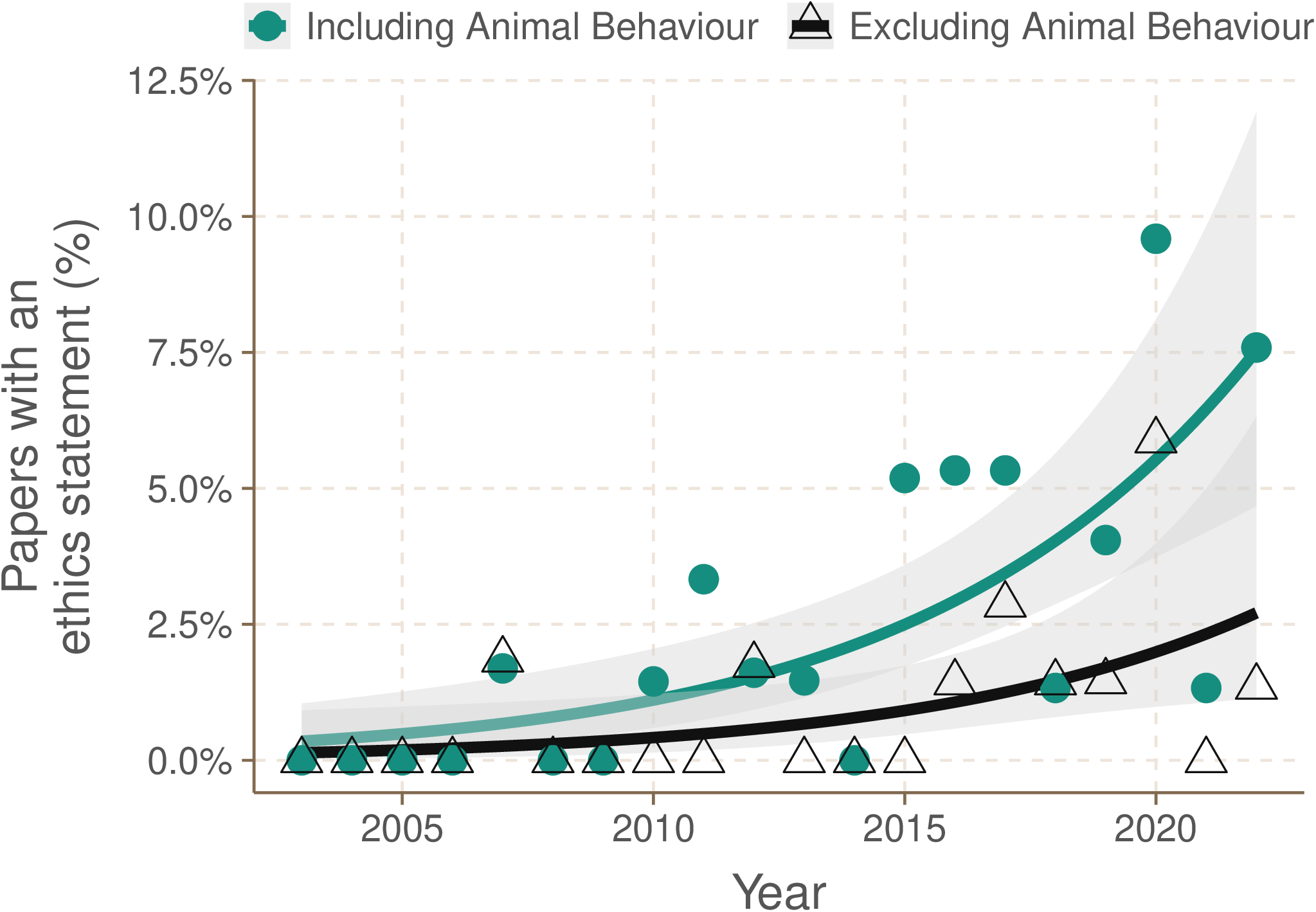Publication Alert: What do entomologists think about insect welfare?
Figure 3 from Barrett et al. 2024, showing the reasons that entomologists selected for why they care about insect welfare, including the intrinsic value of the animal, concerns about public perceptions, cost/time savings, improving reproducibility, personal discomfort with research practices, other, or N/a (I do not care about insect welfare at all).
Entomologists' knowledge of, and attitudes towards, insect welfare in research and education (Barrett et al. 2024; Ecological Entomology)
Acknowledgement of Funding and Conflicts of Interest: No funding was provided to the authors of this study to conduct the survey or write the publication. Funding for BF to attend the workshops at Ento23 and ESA 2023 was provided by the Insect Welfare Research Society. MRB was supported wholly, or in part, in attending these meetings via the Entomological Society of America's program enhancement funds and via her role on the Publications Committee of the Royal Entomological Society.
BF and MRB report a relationship with the Insect Welfare Research Society that includes a board of directors (unpaid). MRB reports a relationship with the Royal Entomological Society that includes Publications Committee.
In 2023, we held workshops at the Entomological Society of America and Royal Entomological Society national meetings; at these workshops, we shared some information about insect/animal welfare and then asked participants what they thought could/should be done to improve insect welfare in research/education. From these workshops, we developed six strategies that entomologists had proposed for improving insect welfare and then ran an online survey of self-identified entomologists, asking about their knowledge/attitudes towards insect welfare and about their views on these suggested practices. We analyzed the quantitative and qualitative results, and provided some interpretations of their meaning for a variety of stakeholders, including PIs, institutions, scientific societies, and policymakers or funders.
The paper contains a lot of cool results, of which I’ll highlight just a few here. First, we found that the majority of entomologists believed training on insect welfare was important - this was especially true of younger (e.g., student) entomologists and those external to academia (Fig 2 below). Despite this, the vast majority of entomologists (85%) reported no training on insect welfare. While entomologists didn’t receive training, and reported a generally ‘neutral’ familiarity with methods for improving insect welfare (mean 4.38 on a scale from 1 - 7) and indicators of insect sentience or consciousness (4.39), 44.9% still reported that they used direct or indirect methods for improving insect welfare in their research or pedagogical practice. Most entomologists were concerned about insect welfare due to the intrinsic value of the animal or concerns about public perception.
Figure 2 from Barrett et al. 2024. Students and external-to-academia researchers believe training on insect welfare is more important than faculty. 1, very unimportant; 4, neutral (dashed line); 7, very important.
“In a ‘check all that apply’ question, entomologists were most likely to check ‘intrinsic value of the animal’ as the reason for their concern about insect welfare, followed by ‘concern for public perceptions’ (Figure 3). Entomologists were overwhelmingly concerned about insect welfare for at least one reason, with only a few (n = 8) indicating they were not interested in insect welfare at all.”
Entomologists at the workshops proposed six general strategies for improving insect welfare in research/education; three voluntary and three mandatory. Practice 1: voluntary guidelines generated by labs/classes for their own use; practice 2: voluntary trainings offered by universities or scientific societies; practice 3: voluntary guidelines from scientific societies; practice 4: guidelines from scientific societies and required journal reporting; practice 5: local department- or university-level ethics review; practice 6: legally mandated, nationally coordinated ethics review.
Mandatory practices were largely expected to be more effective at improving the myriad concerns that entomologists had around insect welfare (see Table 4 below), however some of these were also expected to be more costly and challenging to implement. In general, all practices would involve the majority of entomology labs changing their current SOPs (50.8% [practice 1] to 81.4% [practice 6] reported they would need to change SOPs if a practice were implemented). Likely as a result of these perceptions of cost, efficacy, and difficulty, there was also variance in perceived support for these practices among the broader entomological community within the next 5 years. Some practices were expected to be supported by the majority of the entomological community in the next five years (56% support for voluntary welfare guidance produced by scientific societies), suggesting these may be considered as professional ethics best practices by the broader professional community sometime in the near future.
“Expected support among the overall entomological community
for these practices ranged from ~40% for the perceived most difficult
practices up to the (slight) majority of entomologists for the voluntary
practices (~51%–56%). The greatest expected support was found for
voluntary guidelines produced by scientific societies (56%), where the
addition of a mandate to use those guidelines and report on practices
resulted in only an 8% decline in perceived support (practice
4; 47.9%).”
We identified some main take-aways from our results for various stakeholders, including academic institutions, scientific societies, funders/policymakers, and PIs. As a PI myself, the major take-aways for my work were:
Students are interested in training on insect welfare. Entomologists believed that even voluntary practices, such as voluntary guidelines developed by the PI for their lab environment, would have a strong impact on mediating student/researcher discomfort with experimental practices.
Including ethics statements in publications even where not required, engaging with currently available welfare guidance, and answering empirical questions about the welfare of my study organisms are all community-supported practices I can improve my lab’s standard operating procedures in regard to insect welfare. These strategies will also help the field by building a knowledge base on applied insect welfare practices in research, a key part of addressing recurring expertise concerns brought up by my colleagues in the survey.
Want to read more news from the lab?







